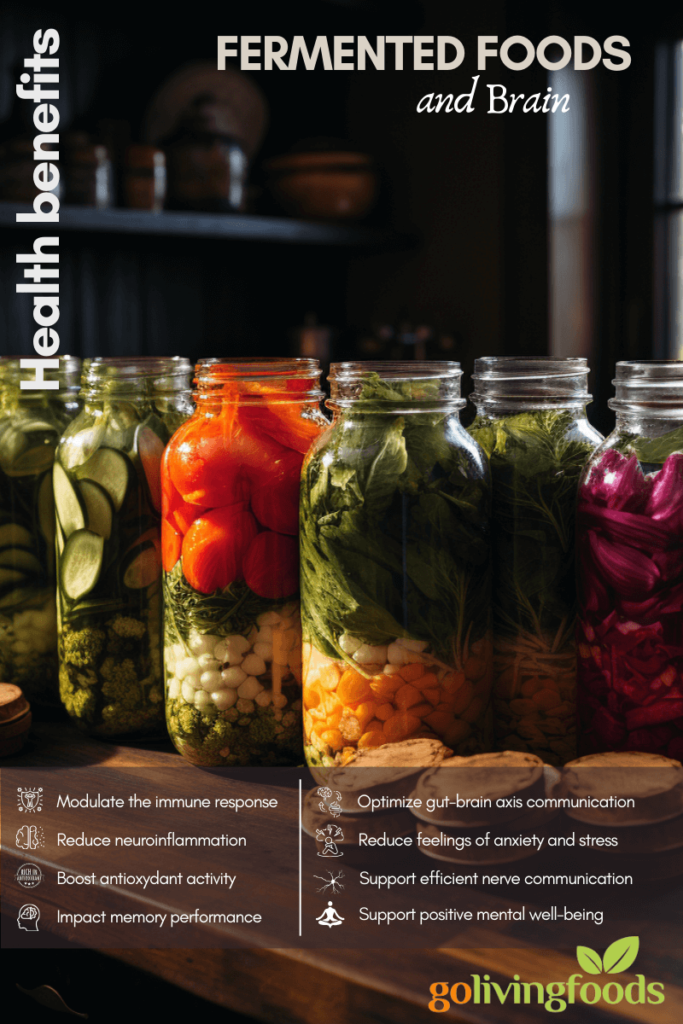Fermented Foods: Can They Help Fight Alzheimer’s Disease?

Alzheimer’s disease, a progressive and debilitating neurodegenerative disorder, is a significant global health concern. As the population ages, the number of individuals affected by Alzheimer’s continues to rise, highlighting the urgency to explore potential preventive and therapeutic strategies. While there is no cure for Alzheimer’s, scientific research is shedding light on lifestyle factors and dietary interventions that may influence cognitive health.
In recent years, fermented foods have gained popularity for their potential health benefits, particularly concerning gut health and the microbiome. Researchers are increasingly interested in understanding the link between the gut and the brain, known as the gut-brain axis, and its impact on cognitive function. This article delves into the intriguing question: Can fermented foods play a role in fighting Alzheimer’s disease?
Understanding Alzheimer’s Disease
Alzheimer’s disease is a complex and progressive neurodegenerative disorder that affects the brain, particularly areas responsible for memory, thinking, and behavior. As the most common cause of dementia, Alzheimer’s accounts for approximately 60-80% of all dementia cases. It predominantly affects older adults, with the risk of developing the disease increasing with age. While the exact cause of Alzheimer’s is not fully understood, researchers believe that a combination of genetic, environmental, and lifestyle factors contribute to its development.
1. Pathological Changes in the Brain
In Alzheimer’s disease, the brain undergoes characteristic pathological changes, including the accumulation of abnormal protein deposits. Two types of protein deposits are commonly observed in the brains of individuals with Alzheimer’s:
These protein aggregates contribute to the progressive loss of nerve cells (neurons) and synapses in the brain, leading to cognitive decline and memory loss.
2. Cognitive Symptoms
Alzheimer’s disease has a range of cognitive symptoms that gradually worsen over time. Early signs may include mild memory lapses and difficulty finding the right words. As the disease advances, individuals may experience:
3. Impact on Daily Life
As Alzheimer’s progresses, its impact on daily life becomes more pronounced. Individuals may require increasing assistance with daily activities, such as bathing, dressing, and eating. Communication becomes more challenging, and they may withdraw from social interactions. Additionally, cognitive decline affects the ability to manage finances and handle complex tasks.
4. Challenges for Caregivers
Alzheimer’s not only affects individuals with the disease but also places significant emotional, physical, and financial burdens on caregivers. Providing care for someone with Alzheimer’s can be demanding, especially as the disease advances and requires more specialized attention and support.
Despite extensive research, there is currently no cure for Alzheimer’s disease. However, early diagnosis and appropriate interventions can help manage symptoms and improve quality of life for individuals with the condition.

Fermented Foods and the Gut-Brain Axis
The gut-brain axis is a bidirectional communication system that links the central nervous system (CNS) and the gastrointestinal (GI) tract. This complex network involves a constant exchange of signals between the brain and the gut, influencing various aspects of physical and mental health, including cognition, mood, and behavior. Emerging research suggests that the gut-brain axis plays a crucial role in neurodegenerative diseases like Alzheimer’s, and fermented foods can have a positive impact on this connection.
1. Microbiota and Gut Health
The GI tract is home to a vast and diverse community of microorganisms collectively known as the gut microbiota. These microorganisms, including bacteria, viruses, and fungi, play a vital role in maintaining gut health and overall well-being. A balanced and diverse gut microbiota is associated with improved digestion, nutrient absorption, and a strengthened immune system.
2. Gut Microbiota and Brain Health
The gut microbiota can influence brain function through several mechanisms. One of the key pathways is the production of neurotransmitters. For example, certain gut bacteria can produce neurotransmitters such as serotonin and gamma-aminobutyric acid (GABA), which are involved in mood regulation and stress responses. Moreover, the gut microbiota can produce short-chain fatty acids (SCFAs) during the fermentation of dietary fibers. SCFAs have been shown to have anti-inflammatory and neuroprotective effects, supporting brain health.
3. Fermented Foods and the Gut Microbiota
Fermented foods are rich in beneficial live bacteria, known as probiotics, which are created during the fermentation process. When consumed, these probiotics can colonize the gut and contribute to a healthy gut microbiota balance. Some common fermented foods that are potential sources of probiotics include:
4. Fermented Foods and Brain Health
The potential impact of fermented foods on brain health is an area of growing interest in scientific research. The direct effects of fermented foods on brain health are still being explored, however, several mechanisms have been proposed to explain their potential benefits:
5. Role of Probiotics in Alzheimer’s Disease
Probiotics, the beneficial bacteria found in fermented foods, have been a subject of growing interest in relation to Alzheimer’s disease. Although research is still in its early stages, some studies suggest that probiotics may offer potential benefits for individuals at risk of or already experiencing Alzheimer’s disease. Here are some ways in which probiotics may play a role in Alzheimer’s disease:

Nutritional Content of Fermented Foods
Fermented foods are not only tantalizing to the taste buds but also pack a nutritional punch. The fermentation process enhances the bioavailability and concentration of essential nutrients, making these foods a valuable addition to a well-rounded diet.
Below, we explore the nutritional content of some common fermented foods:
1. Probiotics
Probiotics are live beneficial microorganisms found in fermented foods that promote gut health. These friendly bacteria can improve gut microbiota balance and support digestion. Common probiotic-rich fermented foods include yogurt, kefir, and fermented pickles.
2. Vitamins
Fermented foods are often excellent sources of essential vitamins. For instance, yogurt and kefir are rich in vitamin B12, a nutrient vital for nerve function and DNA synthesis. Additionally, fermented dairy products can provide vitamin K2, which may have protective effects on the brain.
3. Minerals
Some fermented foods are abundant in essential minerals. Kimchi, a traditional Korean fermented dish, is a good source of calcium. Other fermented foods like Miso and Tempeh offer valuable minerals such as iron, zinc, and magnesium.
4. Dietary Fiber
Fermented foods are known for their dietary fiber content, which supports digestive health and helps regulate blood sugar levels. Sauerkraut, a fermented cabbage dish, is an excellent source of fiber, aiding in bowel regularity.
5. Omega-3 Fatty Acids
Certain fermented foods, such as fermented cod liver oil and natto (fermented soybeans), contain omega-3 fatty acids. Omega-3s are essential for brain health and have anti-inflammatory properties.
6. Short-Chain Fatty Acids (SCFAs)
Fermented foods can promote the production of SCFAs, such as butyrate, acetate, and propionate, during the fermentation process. SCFAs play a role in gut health and have been linked to potential benefits for brain health.
7. Bioactive Peptides
Fermented dairy products, like yogurt and kefir, contain bioactive peptides that may have health-promoting properties, including cognitive benefits.
8. Antioxidants
Some fermented foods, such as Miso and Kimchi, boast antioxidant compounds like Flavonoids and phenolic acids. Antioxidants protect the body’s cells from oxidative stress, which may have implications for brain aging.
It is important to note that the nutritional content of fermented foods may vary depending on the specific fermentation process and ingredients used. Incorporating a variety of fermented foods into one’s diet can provide a diverse array of nutrients that support overall health, including brain health.
Takeaway
While research on the relationship between fermented foods and Alzheimer’s disease is still evolving, there is growing evidence to suggest that these foods may offer potential benefits for brain health and cognition. The gut-brain axis appears to play a crucial role in this connection, highlighting the importance of maintaining a healthy gut microbiota through probiotic-rich fermented foods.






